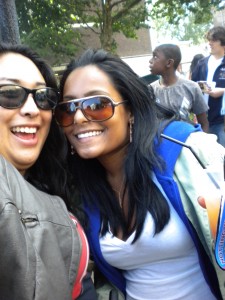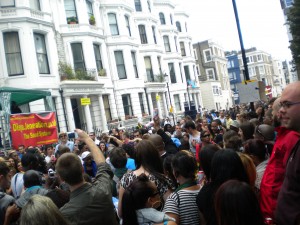September 2nd, 2010 · 8 Comments
Have you ever wondered what the world would be like if we didn’t make divisions amongst each other based on race, class, culture, or religion? I have. I have wondered would it ever be possible to achieve this? Growing up in South-Central Los Angeles taught me two things; stick to those like you, and every man for him/herself. These “teachings” however always felt wrong, and they were. My parents ensured that within our household each member is open to different races, class, culture, and religion through the art of inquiry and respect. But as much as my parents taught me this and as much as I practiced it I have never truly found it reciprocated. That was until August 30, 2010, location-the Notting Hill Carnival.

I had to travel 16 hours away from home, South -Central Los Angeles to find what I believed to be impossible. The Notting Hill Carnival began in 1964, as a way to celebrate the cultures and traditions of the Afro-Carribbean communities that reside in England. Over time it has become the largest street festival in all of Europe. (For further information go to http://www.thenottinghillcarnival.com/history.html) This festival, which celebrates, cultures and traditions of people not native to England itself could only reach its magnitude through support and participation of outsiders. That is precisely what I witnessed and felt this last Monday, August 30. As previously trained by experience, I expected the Carnival to be filled with Afro-Caribbean people and only a trickle of White-British people. To my astonishment the Carnival contained thousands upon thousands of White-British people who were not just there to observe this beautiful festivity but were actively participating through their wear, dancing, and eating of foreign food. It was bliss. It somehow gave me back that sense of hope that I had lost a while back; the hope that we as a people really can accept one another and beyond that celebrate one another’s differences.
Afro-Caribbean cultures were completely new to me. California, really only has cultures from Central and South America, and much of Eastern Asia. Therefore, before last Monday, I had never seen nor tasted Jamaican food. Luckily, I had Melissa Gurdon with me, a Jamaican-American , she quickly gave me the run through of Jamaican cuisine. After a plate of Jerk Chicken and Sweet Corn, I was in heaven. After seven hours of being in Notting Hill, Melissa and I, finally decided to hit the road and return to our home in Bloomsbury with a full stomach and a happy heart; hoping to return in one years time.


Tags: 2010 Jamie
September 2nd, 2010 · 4 Comments
In England, I have discovered beer to be an appropriate beverage for any time, place, or person. It can be a drink of the everyman and a drink of the aristocrat, a refreshing drink for the conservative manual worker or the Avant-garde intellectual. In my first week in London, I have had beer in so many different contexts that I am now convinced of this fact.
At the Notting Hill Carnival, London’s yearly Afro-Caribbean festival, Red Stripe (a popular Jamaican beer) was the name of the game. Jamaica, similar to former British colonies across the Caribbean, contributed a lot to British culture, including its own style of Britain’s favorite beverage. It seems that where the British once had power, breweries became an essential craft. In this way, the exportation of beer and the making of international beer culture appears to have colonialism to thank.
Colonialism wasn’t that only “ism” that beer has exposed me to this week. The British Museum, one of the world’s most important cultural institutions, has been a place of study for intellectuals since its creation at the end of the 18th century. When these intellectuals were not studying however, I have read that many of them would go across the street from the museum to the Museum Tavern for a pint. After a few intellectually stimulating hours in the museum, we made our way across the street to the tavern. The décor was similar to all other pubs we had visited but this one seemed a bit more authentically 19th century. This feeling was only enhanced by a pint of very delicious ale called “Old Peculiar.” What really struck me about the drinking in this particular pub was knowing that somewhere in that very room Lenin and Trotsky had sat and contemplated ways to liberate the peasants of Russia, or that Marx had sat with a pint after the long days spent writing Das Kapital across the street. Just as beer played a part in British imperialism, so too was beer present in the forefront of intellectualism in Britain.
Classism is also a British cultural topic demonstrated by beer. As iterated by Kate Fox in her book, Watching the English, your choice of beer/beverage can say a lot about a person’s social class. The bartenders and the English people in the pub expect certain people to buy certain drinks and my choice of beer could break unwritten social rules and earn me a liberal amount of strange looks. I have seen this first hand when ordering a half pint of cider (to protect my standing in British society, I must add that this was done for a lady).
Imperialism, Intellectualism, and Classism. All three of these British “isms” are cultural concepts that are literally seeped in beer.

Tags: 2010 MatthewG · Pubs · Uncategorized




